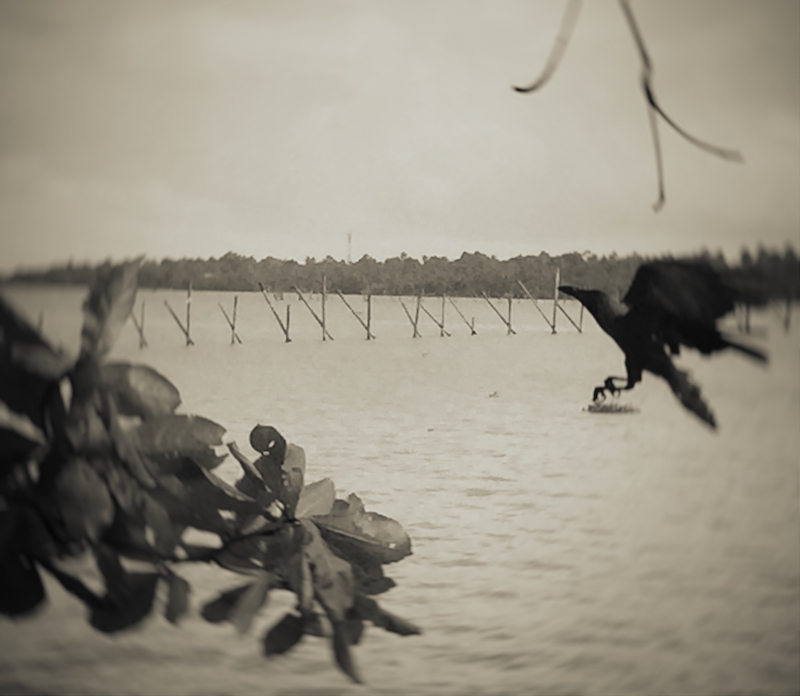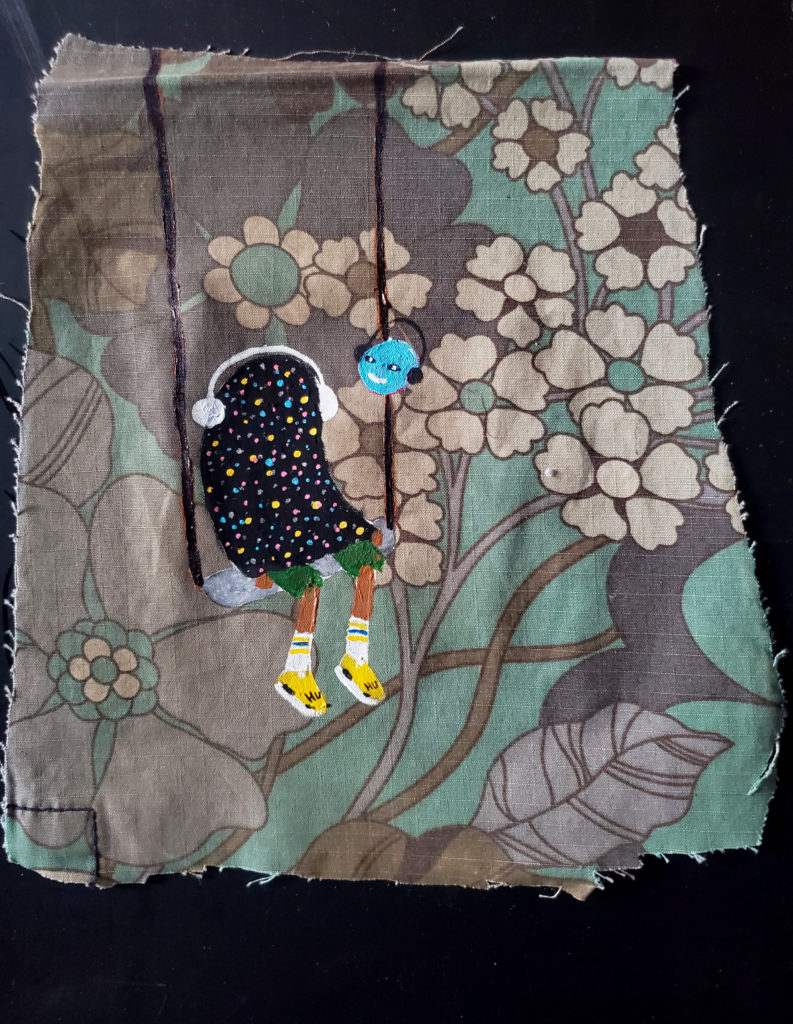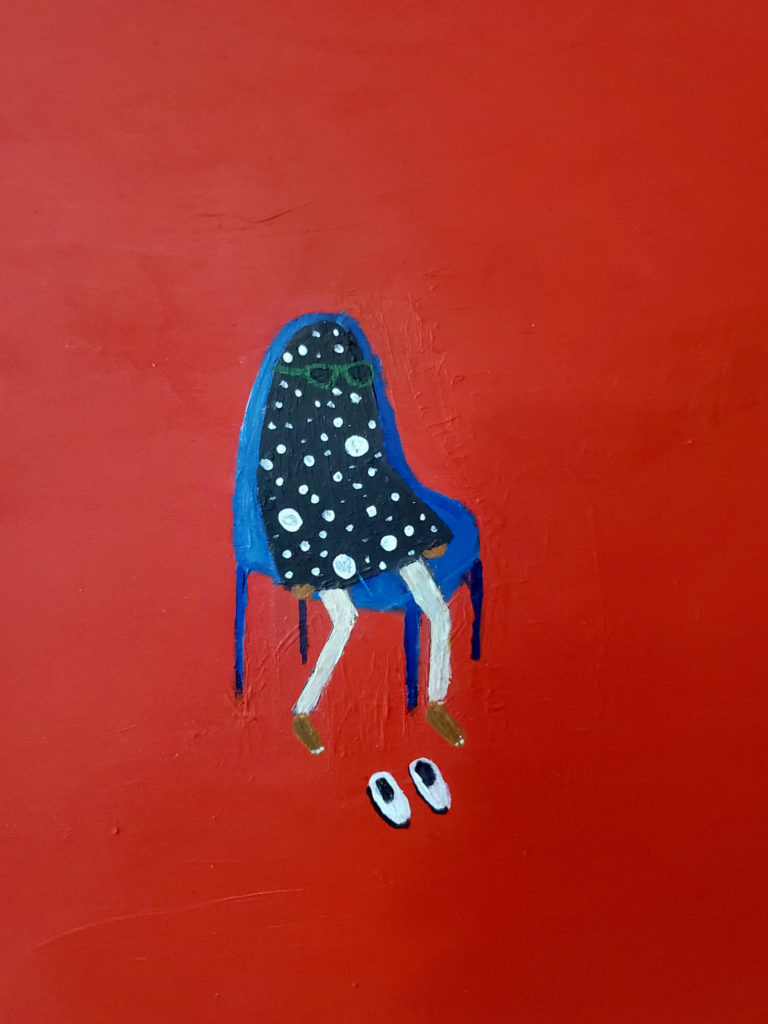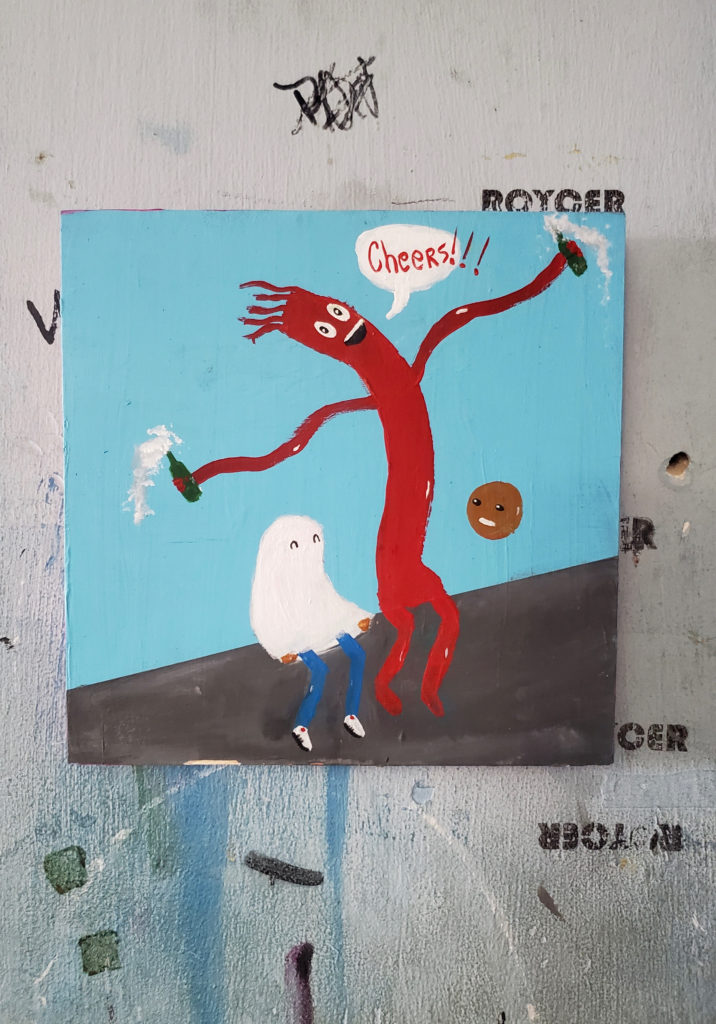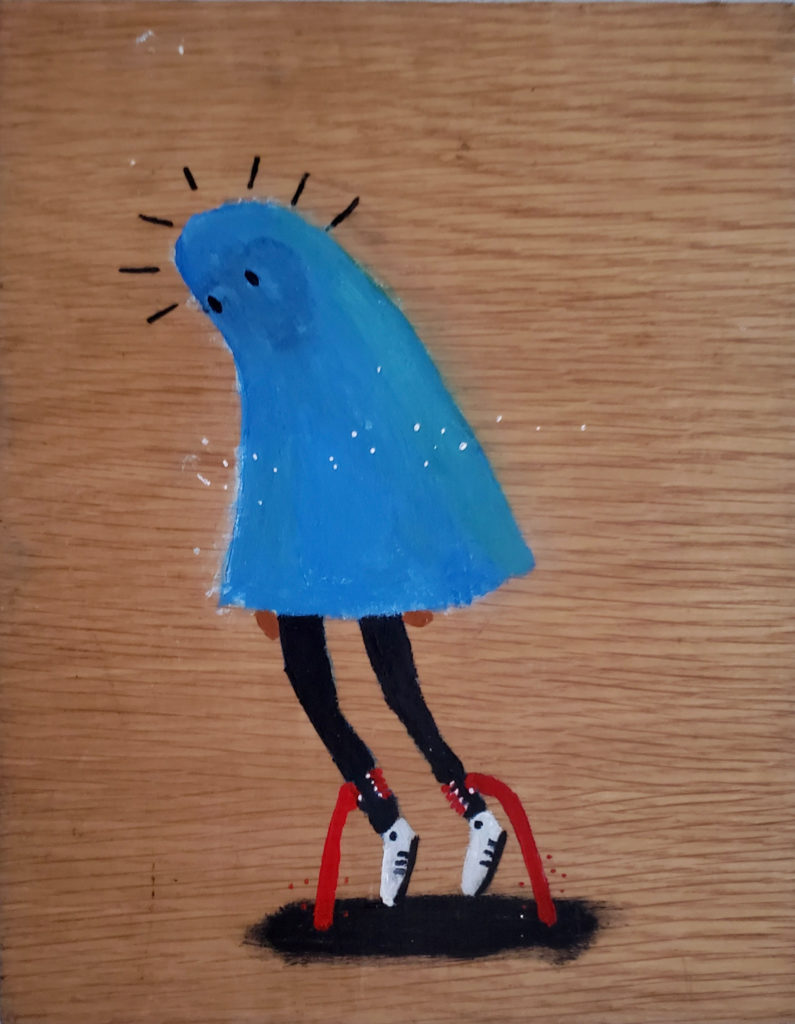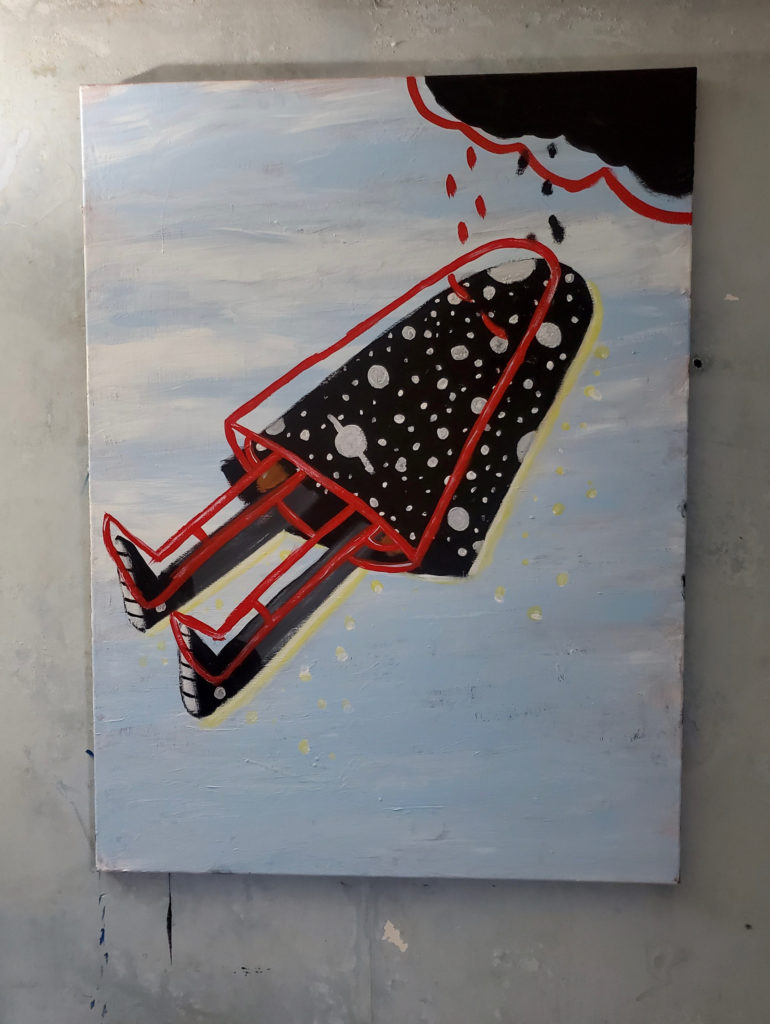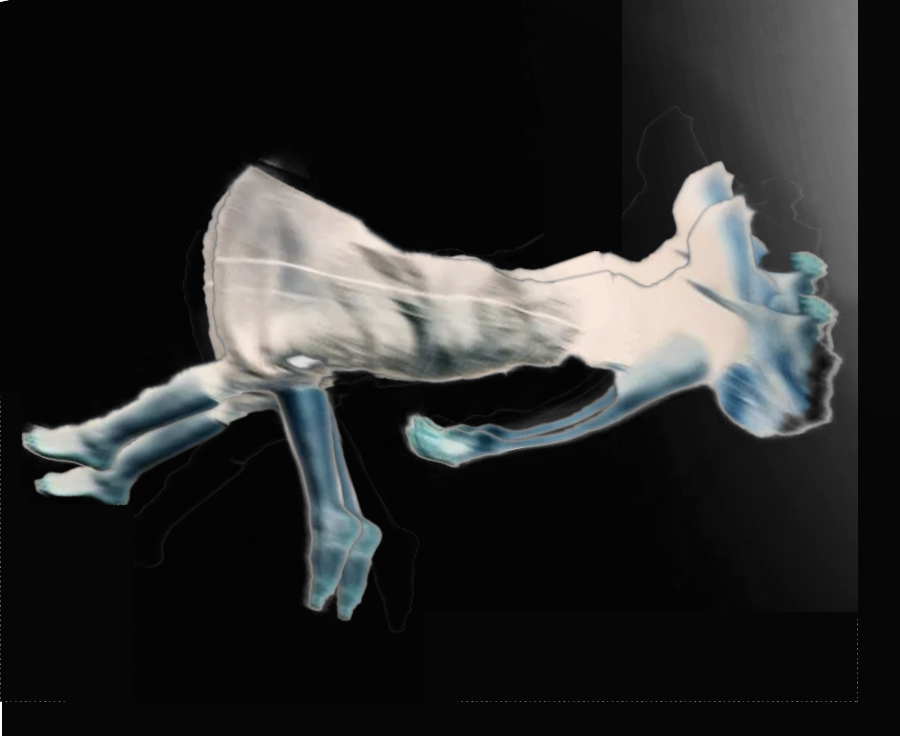Dalinian Triangle
Jeremy Alves da Silva Klemin
She is calling my bluff. She is calling my bluff and looking at me challengingly and already knows what I’m going to say. I tell her I’d like to go with her, but my phone is dead and I would have no way of getting back to the hotel. She wastes no time with her response.
“You can run and go get your charger, if you want. We’ll wait.”
I’ve apparently run out of excuses, so I agree and make my way toward the three elevators tucked in a corner near the buffet area of the hotel. Going up, I start second-guessing my decision and consider backing out. I can’t think of a particularly valid excuse aside from being tired, which seems insufficient, so I find myself continuing toward my room. Many of the decisions I’ve made while in Brazil have followed this format: I do not have a readily available alternative or a legitimate excuse, and so I am swept along, acting in opposition to my instincts. I grab my charger, wipe the warm evening’s sweat off my forehead with my shirt, and quickly change into an identical one. One of the beauties of Brazil is the country’s active hostility toward excessive formality—a black shirt is appropriate for almost any occasion.
I get in the car that is waiting for me and apologize for the delay. It’s unclear to me if the driver works for Uber or if he is a relative of one of the children in the backseat. Their names are João and Catarina; they’re eight and eleven years old, respectively. I’ve just agreed to attend João’s eighth birthday celebration. Mariana, the woman who has invited me to the party, is a fellow American. We’re both staying in the Bahia Othon Hotel as part of a conference for a Fulbright grant we’re on in Brazil. Mariana happens to be posted in Salvador, the city we’re currently in. Her connection to João and Catarina is initially unclear to me, but I learn that they are her Brazilian neighbors. I take note of them because I haven’t seen any other kids in the hotel—there are 115 Fulbright grantees staying here, and it seems as though we make up a significant portion of the hotel’s current clientele. Because we work in universities, those of us not living with host families almost never interact with younger Brazilians.
Before spending the past twenty minutes helping Mariana look for the keys she’d lost while doing capoeira on the beach that day, I’d never formally met her–I know perhaps a third of the cohort by name, and have spoken passingly with roughly half of them. I’d first noticed her when she spoke up in a session earlier that day, which was about race and ethnicity within the Fulbright cohort–issues surrounding diversity have served as a sort of backdrop for the weeklong conference; impassioned debate has been common since the grant began five months ago. Most of these disagreements have been leftist in-fighting–the Fulbright, because of the type of program it is, mostly attracts progressives. In our cohort, there are six or seven, maybe, who would be classified as centrists, and even so, all but perhaps one or two of that group is of the social-liberal/fiscal-moderate type. Solidly left by any metric, I am not among these centrists. The session today was about being an ally, about how white folks in the program can more actively support their POC co-workers. The activity involved splitting up white and POC-identifying Fulbrighters into separate rooms and then bringing them back together for closing remarks. The ending of the session felt like a muted version of those same disagreements–the explicit end goals of the activity were unclear, and so most left the room feeling more conflicted than they had before.
The driver and I start chatting in Portuguese, and Mariana remains quiet in the backseat. I tell him I’m American, but live in the south of Brazil.
“Ahh, Americano. I used to teach capoeira to an American here. You know capoeira?”
“Yeah, of course!” I turn to the back seat. “Mariana, you do capoeira, no?”
Mariana nods. It’s unclear to me if she’s not participating in the conversation because she has trouble understanding or because she’s disinterested. The only Portuguese I’ve heard her speak is in the form of relaying basic information to João and Catarina.
While driving, he pulls up the Facebook of the American he taught, asking if I know her. Unsurprisingly, neither her face nor her name registers.
From the back, João says something about Catarina being sick. I initially have trouble understanding both of the children, but the cadence of the Northeastern accent becomes gradually less difficult as I recall the numerous Bahians I’d met while living in Portugal–I’d spent the last fourteen months there working remotely and learning Portuguese. My grandfather was born between Lisbon and Cascais a year before the Great Depression, and both my mother and I are citizens of the country. Though I have room to improve, I’m more or less fluent in the language. European Portuguese is significantly different from its Brazilian counterpart (the gap between the two is larger than that of European and Latin American Spanish), but nevertheless, with some adjustments, I’m able to get along well in Brazil. This made the settling-in process easier for me than most other grantees, as most folks came to Brazil speaking Spanish, but little Portuguese.
We’re almost out of the center now, passing places I vaguely recognize from the day before. To compare the center of Salvador to, say, the historic centers of Europe would be both misleading and imprecise. Like the rest of Brazil, Salvador has no referent: it is wholly itself. Nor is there a useful comparison for the drastic difference between the center of Salvador and even a mile or two out of it; the only other place I’ve been with so little buffer between wealth and poverty is Rio. As we get closer to our destination, it becomes clear that João was right about Catarina–she has started throwing up in the back seat, apparently not used to being in cars. It is a sobering realization for me–in what circumstances does Catarina ride in a car in her day-to-day life? The driver rather unconcernedly asks if she’s vomitando, which, given his nonchalance, leads me to believe that he is a family member after all. Nor does Mariana seem particularly concerned, even though Catarina is (mostly) throwing up in Mariana’s backpack.
We come to a stop in a rather nondescript place. We’re no longer in Salvador’s architecturally rich beach/hotel triangle, but we’re not in the city’s periferias, either. Translating information about the structure of cities into or out of English is often difficult, primarily because the nature of wealth dispersion varies by country. During the World Cup, which had come to a close a few days earlier, I watched a Portuguese-language interview with Gabriel Jesus, a baby-faced, instantly likable player for the Brazilian national Seleção. In the interview, he talks about growing up in the periferias, which, in the video, is translated as “suburbs.” I was mildly shocked by the callousness of the translation–for any native English speaker, “suburbs” means something entirely different from what Jesus is trying to get across with periferias. Because of this one difference, the assumed arc of his life is drastically altered. No longer is Jesus a rags-to-riches story for the English-language viewer, no longer is he favela-feel-good material, but an inhabitant of the suburbs. I imagine expensive sports camps, overzealous parents, and whatever the Brazilian equivalent of a soccer mom van is. The wrong picture.
I see the driver open up his Uber app, which means that I was wrong after all. This is a surprise, given how nonchalant he is in response to a child throwing up in his car. Mariana’s backpack (and likely her Uber rating) are in a miserable state. To our right, maybe 400 feet away, is a McDonald’s; in front of us is a sloping decline. We inch closer toward the gradient, but João decides he wants to pee behind a light pole settled in a thicket of weeds and we wait for him.
We start making our way down. Mariana turns to me, trying to gauge my reaction. “A little different from what you’re used to, isn’t it?” It’s unclear to me if she’s making a statement about Curitiba, the significantly wealthier and whiter southern city where I’m currently living, or if she’s making a general assumption about my own background. The logic behind where certain grantees were placed has also been a contentious topic among the cohort–I lobbied hard for the southern city of Curitiba primarily because it was the “coldest” big city I could find.
“Sure, I guess so.” I tell her.
Mariana has the same look on her face she did when she invited me to the party. We seem to be communicating on two planes, meaning expressly transmitted and meaning implied, the latter more substantive than the former.
As we make our way down the hill, Mariana asks João if he’s excited for his birthday. He is shy and seems small for his age: I would have guessed he was no older than five or six. While she continues to speak with the children, I notice that Mariana’s Portuguese occasionally reverts to Portunhol, a mix of Spanish and Portuguese, every few sentences: Vir becomes venir, the endo gerund on occasion, though not always, becomes iendo. I want to ask her if she speaks Spanish natively, but don’t want to come across as a white person interrogating her authenticity if the answer is no. In my home state of California, the only thing worse than being a proud Spanish speaker is being a brown person who can’t speak Spanish. I’ve grown up with countless monolingual Perezes and Guerreros and Muñozes who don’t speak Spanish because their parents wanted them to be “as American as possible”–if not one generation back, then two generations back. Nor is my own family exempt from this. Despite knowing no other background save Portuguese, my mom grew up monolingual because her parents wanted her to be a “normal” American, an American sans hyphenation.
Ahead of me, I can see multicolored houses and huts sprawling along the hillside. I can’t rightly call this a favela because Brazilians seem very particular about what this term constitutes, but to my untrained eye, the communidade we are entering is at the very least favela-esque. I remember another American in the city offhandedly mentioning that one of his coworkers had decided to live outside of the city center of her own volition, and as we continue down the seemingly endless slope leading into the neighborhood, I realize at that moment that he was referring to Mariana. I also remember asking him if Mariana (though at the time, of course, I didn’t know it was her) chose to live outside the center because it was cheaper, but he seemed certain that she was not saving any money by doing so. I wonder if I’ve made a mistake, if I’ve now unwittingly become the pivot for a point Mariana is trying to prove.
We make our way through a narrow passageway with beat-up doors on either side, which eventually opens into a sort of courtyard or gathering area. To the right of the courtyard is another 150 feet or so of sloping greenery; past that is the rocky waterfront of Salvador’s bay. I had no idea we were still close to the water.
In the courtyard itself, there are around fifteen to eighteen people, roughly a third of whom are children, a third teenagers, and another third adults, most of them women. All but one of them, besides me, is some version of the Brazilian understanding of black–cafuzo, mameluco, or mulatto. Mariana briefly greets them as we pass by, entering into another narrow passageway barely wide enough for two people standing side-by-side. We’re again descending, ostensibly getting closer to the water. Mariana rings a bell, and a woman in her mid-forties comes out. I first notice her striking green eyes, which remind me of the Cabo Verdeans I’d met in Portugal. She is beautiful, even though she looks both momentarily tired and perpetually sleep deprived. After a brief exchange about the lost set of keys, she gives Mariana a backup copy, explaining that it is not a perfect replica, but might work anyways.
We unlock another gate and walk into a sort of living room. A woman is sitting on one of two couches hunched over smoking a cigarette; next to her are a stack of books and newspapers. Two identical doors are just a few feet away from where she’s sitting. To the right of the living room is a kitchen that is semi open-air; less than half of it is covered. I make a mental note about the setup of the kitchen, initially surprised, but only later do I realize just how unusual it is. Salvador is perpetually between eighty to ninety degrees year-round, but like most of Brazil has a considerable rainy season. How does one cook in the rain? Aren’t there electrical concerns?
Mariana tries inserting the backup key into the lock, and with some enterprising, it works. Good enough, apparently. She signals for me to follow her in.
She tosses her vomit-filled (or at least partially vomit-filled) backpack on a stack of papers. Her room is cluttered, but it’s clear that it follows a logic she understands. A vine pokes past a cloth that seems to be covering a hole leading outside. It looks too small to be a window. Heavy, wooden double windows open westward onto a breathtaking view of the moon over the bay blocked only by a spider the size of a half-dollar coin. I think to myself how impossible it would be to have such a community living so close to prime beach water property in the States, and Mariana seems to read my mind.
“Nobody has property documents here, of course…real estate developers have been hounding them for years. They’re constantly in danger of losing the property.”
“They don’t have any pro bono lawyers helping them?”
“They’re not too eager to accept help from outsiders.”
I’m not sure what this means, exactly, but I nod my head. “I see.”
I wonder if she has formally involved herself somehow in the dispute, if this is her reason for choosing to live here–part of our grant requirement is that we do a side-project of some sort, but I can’t think of a tactful way of asking, and so the moment evaporates. After showing me a bit of the kitchen and chatting with the all-smiles woman on the couch, we head back outside.
“That lady lives upstairs, I don’t know why she’s hanging out in our living room.”
I laugh, unsure if she’s genuinely annoyed or not. We make our way back up to the courtyard where everybody is still gathered.
“You can sit here if you want,” Mariana says, motioning toward the end of a stone fence where a few children and twenty-somethings are sitting.
After five or ten minutes of alternating between watching children play tag and enjoying the view, it becomes clear to me that Mariana won’t be introducing me to anyone. It’s clear, now, what Mariana’s game is. She’s challenging me; she wants to make me feel uncomfortable. That I’m forced to parse through expressed and implied meaning in Salvador, of all places, is not without irony. I remember in Portugal, when having a “serious relationship conversation” with my Bahian ex-girlfriend, she would speak in English, and I would speak in Portuguese. I thought, at the time, that we did this to introduce levity into an otherwise difficult conversation, but in retrospect, it was the obliteration of subtext that speaking in a foreign language provides that we were after, the brazenness that being another version of yourself allows. “Por que me trouxeste cá?” would put up far less resistance in the back of my throat than, “Why have you brought me here?”
A teenager and a young man are scraping away at an old checkers board, and I ask them what they’re doing but don’t quite understand the explanation. I ask them both about Mariana and about João’s birthday, but I can see they’re only tolerating me. I get up and go toward the railing that separates the courtyard from the bush below.
I’m closer to where Mariana is now, near the cake and the rest of the food. The mother with whom I’d already spoken offers me food, and I try to find an excuse not to eat it. I don’t eat meat, and realize that I’m transgressing one of the most universal social rules on the planet–accept food you’re offered.
“Alérgico.” I mumble.
“But you can eat popcorn, no?”
I glance toward the popcorn, coming to terms with the fact that it will probably be my social crutch for the rest of the evening. I start picking at the kernels one by one trying to make my lifeline last as long as possible.
“Come on, man, eat more than that! You’re making me look bad.” Mariana says to me, managing to joke in a way that is not, in the end, joking. She’s not wrong, though. I’m offered food again, and resolve to go sit back on the wall to avoid further awkward food situations. A few minutes later a teenager comes up to me.
“Cê não é Brasileiro?”
“No, I’m from the US. I do the same thing Mariana does, but in Curitiba.”
“Where are you from in the US?”
“Los Angeles…Long Beach.”
“I love West Coast rap!”
“Snoop Dogg is from Long Beach, have you heard of him?”
“Snoop Dogg! I like to smoke herva while listening to Snoop Dogg. I love American music, love American hip hop.”
“Yeah, me, too. I like Brazilian rap, too, lots of good music right now. What groups do you like?”
“Older stuff, you know, Wu Tang Clan, Lil Wayne, older stuff, man.” “Old school,” he says in English, pronouncing it with a Brazilian D–oldgee schooluh.
“How old are you?”
“Seventeen, he says. You?”
“Twenty-five.”
He motions for me to follow him, and we walk back to the lookout point, which is maybe 100 feet away. “It’s beautiful, no?”
“Very beautiful, man.”
He tells me he used to take his ex-girlfriend down to the water, and they’d smoke weed together. We touch on universals–about not texting your ex, about avoiding weed edibles at all costs, about life in the US compared to life here.
He points more or less in the direction of my hotel. “I work down there.”
I don’t fully understand what he does, but it’s either working right on the beach or doing labor of some kind. I learn that he earns around 1,500 to 2,000 reais a month, and works around forty-five hours a week. Not ideal, but far fewer hours than many Uber drivers I’ve met. 1,500 reis is anywhere from 400 to 450 USD, depending on the rapidly fluctuating exchange rate. Not much, but by my understanding of wages in Brazil, not bad at all for a seventeen-year-old doing menial work.
“It’s enough to eat, go out, have fun and relax, you know?” he says.
A bit more time staring out at the moon, and he tells me that he has to go to sleep soon.
“What was your name?”
“Jeremy, you?”
“Lucas.”
“Um prazer, Lucas.”
If Lucas was suspicious of me for being a foreigner or for being from outside of his community, I didn’t notice. Maybe one negated the other, maybe being a foreigner was better than being a Brazilian from the south. I was not a novelty, not completely–Mariana, at least, had come before me. It’s still entirely unclear to me how she’d even found the room to rent, but without her, I wouldn’t be here.
After Lucas leaves, I return to the social crutch as old as Time itself, the snack table. I circle back around to my popcorn, taking care to eat a fair amount so I won’t be offered food with meat again. People are gathering for Happy Birthday–I sing along, watching as João continually blows out his candles, lights them again, and blows them out. As everyone disperses, Mariana turns toward me, interested that I’ve spent the last twenty minutes or so talking to Lucas.
“Seems like you’ve made a friend. I actually don’t know him; I’ve seen him around but never talked to him before. What’d you talk about?”
“Rap, his girlfriend, the dangers of edibles. You know. He’s a nice dude, started talking to me. Super friendly.”
“Yeah, he seemed friendly.”
After talking to Lucas, Mariana seems more open toward me–I feel as if I’ve passed some significant barrier, as if my rapport with Lucas has in some way made Mariana less wary of me. It becomes clearer that Mariana’s decision not to introduce me to anybody is a calculated decision and not mere tactlessness.
A few minutes pass, and folks start shuffling home. The evening is waning. João sits down with a ukulele and starts strumming.
“Let’s go, João, it’s getting late and you have school tomorrow!” I’m not sure what this woman’s relation is to João, but she’s too old to be his mother.
“He’s a very serious man, you know. An artist.” I joke, and the woman laughs and agrees.
“Where are you from?” You have to try food from the northeast!” She names a bunch of foods I can’t eat, and I stand there smiling, about to voice my agreement.
Before I can agree with the woman, though, Mariana blurts out that I’m a vegetarian. I am less than pleased–this is not information that this woman needs to know, not something that inspires trust–o branco, the whitey, is too good for our foods, it says. It feeds into the sort of evangelical trope that I try so hard to avoid. I try to convey all of this in a look directed at Mariana.
“It’s okay! He can still eat chicken and fish. We love fish here, shrimp…”
I smile, and we talk a bit more about nothing in particular. As I’m leaving, I give her a hug and am reprimanded for not giving her “a Baiano hug.” I’m grabbed again, vigorously–no room for Jesus in between. I laugh again, she laughs, and Mariana and I are on our way.
“Not too many outsiders come through here. There were two Austrian ladies here, doing some type of research–took a while for the community to accept them.”
I nod, listening. She says very little about what her own settling-in process had been like here, about whether people immediately pegged her for a foreigner or if, without speaking, she passes for being Brazilian. Another one of the joys of Brazil–like the US, anyone can pass for Brazilian as long as they keep their mouth shut. This still holds true in Salvador, the blackest city outside of Africa. I have Portuguese relatives who grew up in Rio, who returned to Portugal with the sort of mangled, mixed accent that only children or non-native speakers can have, but if I am to pass for being Brazilian, it’s likely as an Italian descendent from the south.
Many of these European descendants in Brazil’s South arrived during the country’s branqueamento (whitening) period, which took place in the late 19th and early 20th century. The philosophy is not at all complicated, nor is it unique to Brazil: incentivize “desirable” immigrants to come to your country with the promise of free land and hope that the indigenous breeds out. It’s not dissimilar to what’s happening right now to the Uyghur people in China, where men are being taken away and women are being forced to “pair up” with men from outside the Uyghur community. In the case of Brazil, desirable meant white or Japanese. One of the great ironies of the sort of soft-racist European pride in the south of Brazil is that most of these people, indeed, descend from poor Polish, Italian, and Ukranian farmers–people who moved here as a last resort, who had very little besides their supposed “desirable background.” Far from the sort of eugenic prime stock they envision themselves as coming from.
I am reminded of Esther Kinsky’s book Rivers and the way she writes about the sort of buried, secondhand homesickness for places that, had history played out in a slightly different way, would have been her home. My grandfather met his wife while he was stationed in the US while working for the Portuguese Navy. He also spent time working in Brazil; it’s not hard to imagine a universe where he meets a Brazilian rather than an American woman. In that universe, maybe I wouldn’t be a Southerner after all. Maybe I would have instead been one of the myriad Portuguese descendants in São Paulo or Rio–my grandfather would have easily acclimated in Rio especially, where the city still holds on to the sh sound from European Portuguese.
There is a pause in our conversation, and I try to find something to say. “Have any of the other Fulbrighters visited where you live?”
“Nah. Pedro—the highest up Brazilian on the Fulbright Program–said he was going to come tonight, but canceled because he was tired. Another administrator said so, too–same response. I want people to come here and understand that Brazil isn’t all caipirinhas and good vibes, you know?”
I find some irony in her wanting to show Brazilians a different side of Brazil, but even if I disagree with her means, I’m forced to agree with her ends. Pedro, with his perfectly rootless São Paulo accent, has likely seen fewer favelas than Mariana has. If dramatic wealth inequality in the United States can be described as being “in your face,” in Brazil that inequality must be in your face, it must be in your pores and in the sweat that only year-round summer is capable of producing. Regardless of the good-will (or lack thereof) behind her intention, I can’t help but feel like having a well-off Brazilian or American diplomat come to a community like this is, if not a net positive, at least a net neutral. I am annoyed at Mariana for trying to shock me into feeling uncomfortable, but I am glad I am here. Means and ends.
She continues her train of thought. “People should get out of their comfort zones and get to know the other side of Brazil, but at the same time I’m hesitant about bringing people here, especially white people. Back home, bringing a white person around would lower my credibility, you know?”
“Where are you from?”
“LA.”
“No shit, where? I’m from Long Beach.”
“Haha, Long Beach?! No way. East LA.”
“I’d be up in Boyle Heights sometimes for shows.”
She looks at me–“What do you know about Boyle Heights? That’s where I’m from.”
“I know it’s ground zero for the gentrification battles right now in LA.”
She seems pleased. “Yep, exactly. Is this happening in Long Beach, too?”
“Somewhat in North LB, yeah. Not as big of an issue as in East LA, though.”
I’m not at all surprised that we’re from essentially the same place. I hear it in her voice, in her attitude, in the way she talks about gentrification. The fact that I’m from Long Beach, LA’s more personable, working-class little brother but with face tattoos, seems, too, to have brought us closer. Starting from North Long Beach, up through Compton, and up into LA proper, you can go on “hood tours.” See where your favorite dead rapper is from, marvel at poverty, and gawk at poor state government policy all at once. You can do the same in Rio de Janeiro here in Brazil–there are dozens of paid, guided “off the beaten track” favela tours. See a “different” side of Rio–take a selfie with a bunch of poor, mostly black children for forty reais a pop. I wonder if such a tour exists in Salvador, and if, after my time here, I would learn anything new.
After passing a Coca-Cola advertisement inexplicably pasted onto a low overhang that I must duck to avoid, I realize that we’re not going back to Mariana’s apartment. We start going down a set of treacherous, poorly-lit stairs using the flashlights from both our phones to manage. I’m in a perpetual half-crouch in anticipation of spider-webs. “I tell my neighbors to look here if I go missing.”
A minute or two later, we’re at the water. No explanation of why she’s brought me here is necessary: the view is incredible. We stand together in silence for a few minutes, and then turn around to make our way back up. After passing her apartment and the courtyard, we start climbing up the steep incline we’d initially come down.
“So what, do you just arrive to class drenched every day? There’s absolutely no way to walk up this in the daytime without sweating.”
“Basically, yeah. I use it to work out.”
I wonder to myself if such a dramatic slope factors into rent here, if this is the Salvadorian equivalent of living in a fifth-floor walk-up in a place like Lisbon.
We reach the top of the hill–Mariana must also spend the night back at the hotel; our first session tomorrow morning is at 8:00 AM. “Can you call an Uber? My phone died.”
I don’t know where Mariana and I stand. I’m not sure if we’re friends or colleagues, or if she’s even basically a decent person. I resent her for using me to make a point, but I’m happy that I was able to come. I don’t understand the arrangement between her and the community she lives in, nor do I know if these same people were happy to meet me, or ambivalent, or actively opposed to my presence, or if they even realized I was there. Regardless, means and ends.
I smile to myself and nod, calling the Uber. An exit fee, then. A small price to pay.
Jeremy Alves da Silva Klemin is an essayist and translator. He was a 2018 Fulbright Fellow in Curitiba, Brazil, and has also lived in Portugal and Scotland. You can find other work of his in publications like the New York Times Book Review, Literary Hub, and The Common. He is the editor of Joyland Magazine‘s “Consulate” section and is an MFA student in creative nonfiction at Oregon State University.

